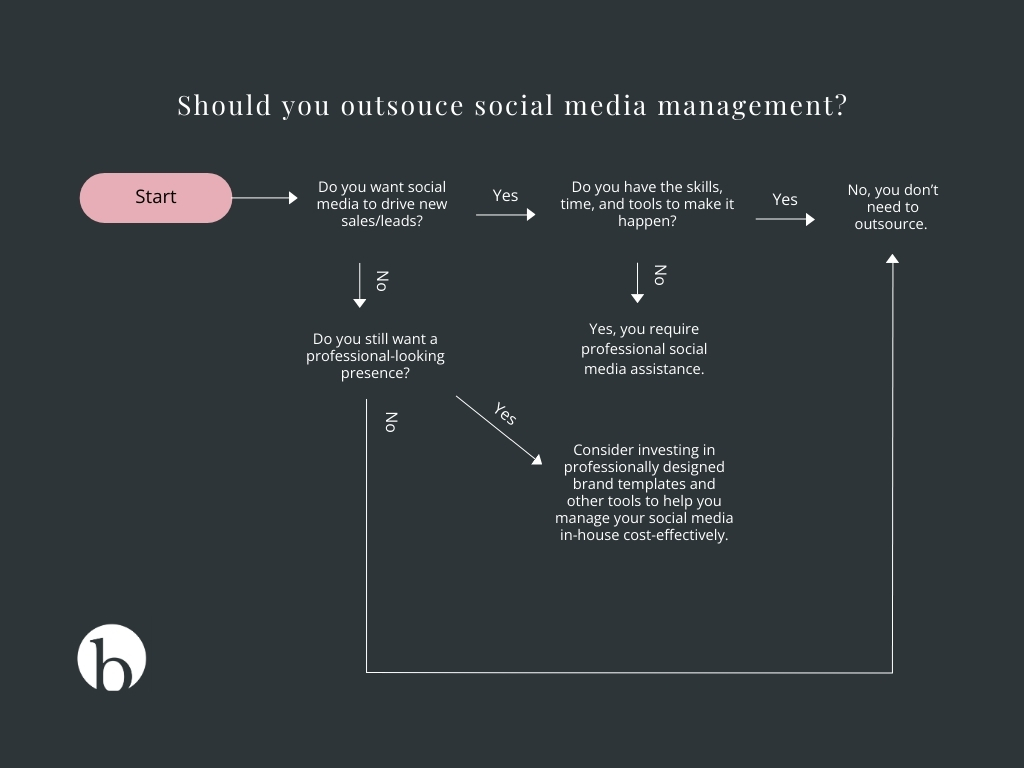Wondering if social media management is worth paying for, or whether you should just learn it yourself?
The short answer: if social media is a strategic part of your sales and marketing, you’ll benefit from at least some professional involvement – but that doesn’t always mean a full-service retainer. For some businesses, the smartest move is a strategy-and-training package with DIY implementation. For others, it’s partial outsourcing. And for a few, it’s worth handing over the whole lot.
The long answer: keep reading because we’re about to get into the nitty-gritty of costs, time, results, and all the weird in-between options that nobody tells you about. And because knowledge is power (and that power belongs to everyone), we’ll be real with you – even if it means admitting you don’t always need a professional.

The ROI of Time (and Why It’s Not Just About Dollars)
Think about how long it takes you to create a single post.
Two hours? More?
A social media manager will probably get it done in half the time – and it’ll likely be sharper, more strategic, and reach a bigger audience. That’s because it’s their thing. They have systems, templates, tools, and processes that you don’t.
So if you bill your own time at, say, $300 an hour and your social media manager charges $120 an hour, you’re already ahead – because the two hours you’ve freed up can go into revenue-generating work, client meetings, or even, dare we say… a coffee break.
And it’s not always about money. Sometimes the real ROI is the fact that you didn’t spend your day hunched over Canva trying to make a post “look right”, and instead spent it doing something only you can do for your business.
The Efficiency Myth
One of the biggest misconceptions about outsourcing is that you’ll pay for the same number of hours it takes you to do the job. Nope.
What takes you a whole day (eight hours) might take an agency four. Because they’ve done it a thousand times before, they’ve got their Canva files pre-set, they’ve got their hashtag lists ready, they know which filters to use without even thinking about it. You’re not paying for time spent, you’re paying for time saved – and the results that come with it.
The Danger of Flying Blind
Even if you do outsource, you still need to understand the basics of social media.
Why? Because the social media industry isn’t regulated. That means there are a few cowboys out there who will happily take your money without delivering meaningful results.
If you don’t know the difference between reach and impressions, or what an industry-average engagement rate looks like, you won’t know if your agency is doing a great job… or just telling you they are.
Our advice?
- Get a little bit of training.
- Read a couple of social media industry blogs each month.
- Keep up with the platforms your audience actually uses.
This way, you can have an informed conversation about strategy, know what questions to ask, and push back when something doesn’t feel right.
Horror Story: The TikTok That Shouldn’t Have Been
We once met with a client – a B2B professional service provider – whose previous agency tried to push her entirely onto TikTok, despite her clients being nowhere near that platform. She suggested LinkedIn. They ignored her.
Worse, the content they were producing for her existing channels was generic meme filler. The kind of “I hate Mondays” posts that do nothing for a professional brand.
When she moved to us, we created a proper strategy, shifted her focus to LinkedIn, and her audience growth took off. The moral of the story? Know enough to recognise when advice doesn’t fit your audience – and trust your gut.
The All-or-Nothing Myth
Here’s the thing: outsourcing doesn’t have to be an all-or-nothing deal.
You might:
- Do it yourself with some pro help up front – like a strategy and training package.
- Outsource just the bits you hate – like scheduling, reporting, or engagement.
- Split the load – where you create content and your agency boosts reach, manages community, or fills in the gaps.
Real-Life Examples of “Some” Outsourcing
Here are some real-life examples of the different ways we help some of our social media clients. We identify where we can add the most value and collaborate with them to create an outcome that works with their budget and their existing skillset:
- Real Estate Agency – Their team handles posts about property listings. We do everything else: team culture, community events, suburb spotlights, and market insights.
- Employment Lawyer – She gives us the legal updates, we turn them into posts.
- Renovation Business – She films her own videos and edits them into reels, we schedule them and distribute them to relevant groups and communities. Then manage the comments and questions that the content attracts.
- Community Management Only – The client posts regularly, but we jump in daily to reply to comments and messages.
There’s no one-size-fits-all approach. You can (and should) customise it to your budget, capacity, and goals.
When NOT to Hire a Social Media Manager
We’ll be honest – the only time we think you don’t need any professional help is if:
- You’re a small business using social media purely for updates (“We’re closed this Friday for the public holiday”)
- It plays no role in your marketing or sales strategy
- You have zero interest in growing your audience or generating leads from it
A great example of this is a business that runs primarily on word-of-mouth, or a contractor that only takes on a couple of contracts per year. In these instances, they need a social media presence to look professional and add credibility to their brand – but they’re not using it to reach new audiences, grow their brand awareness or drive sales and leads.
In every other case? You’ll probably benefit from at least some professional involvement.
Your Next Step
If you’re still unsure, our Social Media Pricing guide breaks down what different levels of outsourcing cost, and our Social Media Management page explains exactly what’s included when you work with us.
Not sure where your brand should even be online? We’ve also got a guide on choosing the right social media channels for your business.



